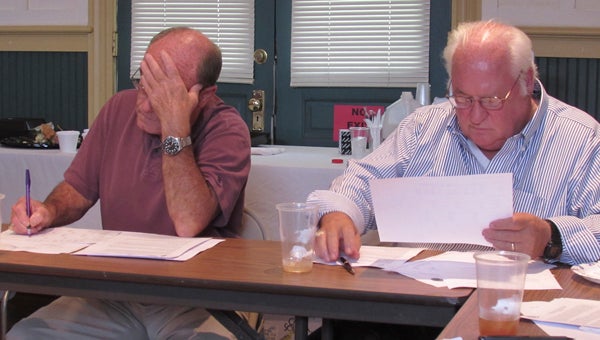WTDA adopts new strategies
Published 8:07 pm Wednesday, September 17, 2014

MIKE VOSS | DAILY NEWS
STUDY MODE: WTDA directors Fred Watkins III (left) and Bill Zachman study financial documents during Wednesday’s meeting.
Washington is preparing to implement its new tourism-development strategies.
Those strategies were unanimously approved Wednesday by the Washington Tourism Development Authority’s board of directors.
The strategies call for increasing the city’s occupancy-tax revenues by 25 percent during the next five years, increasing other revenues by 25 percent during the next five years to ensure the WTDA’s financial stability, educate and engage the community to be more tourism focused, realign the WTDA so it can more effectively achieve its objectives and preserving the integrity of the WTDA, both fiscally and operationally.
The WTDA developed the strategies during its August meeting.
“The beauty of it, because it is a five-year plan, is we can refresh it every year,” said Lynn Wingate, the city’s tourism-development director. “We need to be looking at it every year to see where we are on the plan and if changes need to be made and adjustments need to be made. Essentially, while you’re adopting the direction, it’s a working document over the course of the five years.”
Bill Zachman, who chaired Wednesday’s meeting, said he wants to track how the strategies are implemented and their effectiveness.
“Have you got enough here to set your goals?” he asked Wingate. “That is the principal objective of doing this.”
“Right,” Wingate replied.
The board made it clear it will evaluate progress on implementing the strategies on an annual basis, around the same time it evaluates Wingate’s job performance.
To help increase occupancy-tax revenues, the WTDA will study occupancy trends, identify opportunities to increase occupancy during slow seasons, meet with innkeepers twice a year to discuss their needs and ways to increase occupancy and support the city in its efforts to recruit a downtown hotel.
For every $100 spent on lodging such as hotel and motel rooms, the city collects $6 in taxes.
State law dictates that occupancy tax revenues be used on programs intended to bring more people for overnight stays to areas served by agencies like the WTDA. Washington retains 3 percent of the occupancy-tax revenue for WTDA administration while the WTDA receives the balance.
The city’s 6-percent occupancy tax generated $250,930 in gross revenue during fiscal year 2011-2012, which ran from July 1, 2011, to June 30, 2012. The occupancy tax generated $239,560 in gross revenue in the 2010-2011 fiscal year.
Of the gross tax revenue generated in 2011-2012, the Washington Tourism Development Authority received $243,402. The remaining $7,528 went to the City of Washington for providing administrative services to the Washington Tourism Development Authority.
Occupancy-tax revenues for fiscal year 2012-2013 are expected to be released soon.
To help increase its revenues not derived from the occupancy tax, the WTDA plans to increase sponsorship of the East Carolina Wildlife Arts Festival through personal solicitations and presentations, identify new profit centers for the festival, increase attendance at the festival through marketing and advertising, increase weddings in the city by making the city (Festival Park and other similar venues) a destination for weddings, find new revenue streams for the Civic Center and review existing Civic Center usage and rates to determine the best opportunities for increasing revenue derived from the public’s use of the Civic Center.





